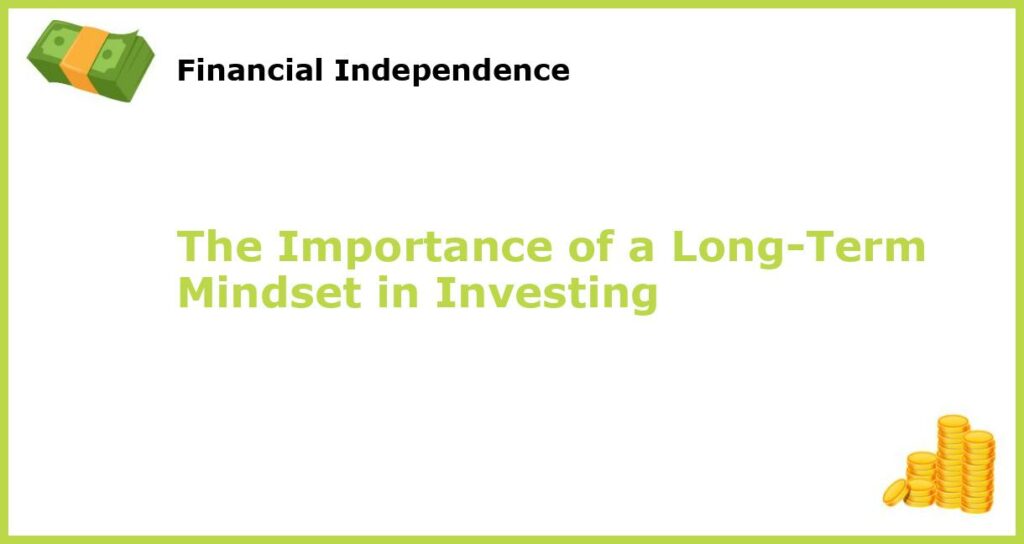Investing has become an essential part of wealth accumulation in today’s world, and a long-term mindset is a vital component of any successful investment strategy. A long-term mindset means that investors take a more patient and disciplined approach, focusing on the long-term potential of their investments rather than chasing quick profits. In this article, we will discuss the importance of a long-term mindset and how it can help investors achieve their wealth accumulation goals.
What is a Long-Term Mindset?

A long-term mindset means adopting an investment strategy focused on the long-term potential of investments. It emphasizes that investors invest in a particular security or asset with a view of holding it for an extended period, generally for years, even decades. This investment strategy requires a lot of patience and discipline on the part of investors because there may be market fluctuations, and stocks’ values may decrease in the short term.
A long-term mindset in investing is different from a short-term view, where investors make impulsive decisions based on the current market trends, attempting to make quick gains. A long-term approach demands that investors analyze the market fundamentally to identify investments that will have long-term value. Therefore investors with a long-term mindset will evaluate potential investments’ intrinsic value, make sound investment decisions based on thoughtful analysis, and hold on to them for years, allowing compound interest to take effect.
Why is it Essential?

The essence of adopting a long-term mindset is to change investors’ perspective about investing and to enable them to focus on achieving their long-term financial goals. Investors who adopt this mindset are not swayed by the market’s everyday volatility, and instead focus on the long-term growth of their investments. By so doing, they can benefit from the power of compounding, allowing their investments to grow and generate more significant returns.
The long-term approach in investing also reduces the pressure to react to unpredictable market movements. In this way, investor emotions are kept in check, and the investor can evaluate their holdings’ performance based on their long-term goals. Long-term investments remain beneficial, as they can provide reliable returns and help investors achieve their long-term financial goals.
The Benefits of a Long-Term Mindset

One of the significant benefits of having a long-term mindset in investing is that investors can maximize the power of compounding, which is the ability of an investment’s gains to generate further long-term gains. Compounding plays a critical role in long-term investments because it helps investors grow their portfolio through time. This means that over time, the growth rate of an investment accelerates, thanks to the compounding effect. Investors who stay committed to long-term investment strategies benefit the most from the power of compounding, as their holdings can compound over time.
Furthermore, long-term investing has the advantage of minimizing the impact of short-term market fluctuations that can harm short-term investors’ portfolios. Long-term investors are better equipped to weather market volatility, as they know it is part of the market cycle, and they can stick to their investment strategy without getting emotional. As a result, long-term investments can provide more consistent returns with less volatility over a significant period.
How to Develop a Long-Term Mindset

Developing a long-term mindset requires investors to develop the discipline and patience needed to ignore short-term market fluctuations in pursuit of long-term goals. Long-term investors take a more thoughtful and careful approach to investing, focusing on the long-term aspects and not obsessing over day-to-day market trends.
The first step in developing a long-term mindset is to have a solid understanding of investment strategies and the principles of compounding. Investors must also have a clear understanding of their long-term investment goals and the right investment vehicles that will help them achieve their goals.
Another way to develop a long-term mindset is by taking a diversified investment approach that focuses on long-term returns instead of short-term profits. Diversification reduces the risk of losing money on a single investment, and it provides a cushion against market volatility.
The Risks of a Short-Term Mindset

Short-term investors often make impulsive decisions based on short-term market performance, leading to a missed opportunity for long-term investment growth. A typical risk for short-term investors is that they focus on the likely short-term earnings to the detriment of long-term success. This shortsightedness may lead to investors missing out on long-term wealth accumulation opportunities, limiting overall returns, and increasing investment risk.
Moreover, investors who adopt a short-term mindset may be susceptible to external factors such as market volatility, leading to emotional responses and decision-making errors. These emotional reactions may harm the investor’s overall returns, leading to missed opportunities for long-term growth.
Staying Committed to Long-Term Strategies
Staying committed to long-term investment strategies requires investors to develop discipline, patience, and the ability to overlook short-term market fluctuations. The key to achieving this is to focus on the long-term goals and investment fundamentals, such as ensuring the right asset allocation.
To avoid getting caught up in short-term market movements that may be harmful, investors need to focus on their long-term goals and investment strategies. Investors must align their investment decisions to the long-term strategy that best delivers their objectives. In this way, they will avoid reacting to short-term market movements that can lead to impulsive decisions.
Managing Risk in Long-Term Investments
Long-term investments are generally riskier than short-term investments, and investors must evaluate their risk tolerance carefully. Investors who adopt long-term investment strategies must take a comprehensive approach to risk management, including diversification across asset classes, sectors, and geographical regions.
Diversification can help investors manage risk by spreading their investment across several securities and asset classes, reducing the impact of losses on any single investment. Furthermore, investors can reduce risk by investing in low-cost index funds that offer broad market exposure and is ideal for long-term investments.
The Role of Professional Advisors
Professional advisors can play an essential role in helping investors achieve their long-term investment goals. With their expertise, advisors can offer guidance on the best investment strategies that will align with their long-term investment objectives.
Professional advisors can help investors understand the intricacies of investing, such as volatility that may impact their portfolio’s long-term success. Additionally, they can educate investors on how to manage risk and provide market insights that help investors make informed decisions geared to long-term growth.
The Importance of Staying Informed
Staying informed is essential to successful long-term investing. Investors need to stay informed about the health of the economy, global markets, and investment trends to make informed decisions that align with their long-term goals.
Long-term investing strategies are not set in stone, and market conditions, economic factors, and other variables can affect their overall success. Investors must remain informed, evaluate their performance regularly and understand the impact of their investment decisions on their long-term goals.







